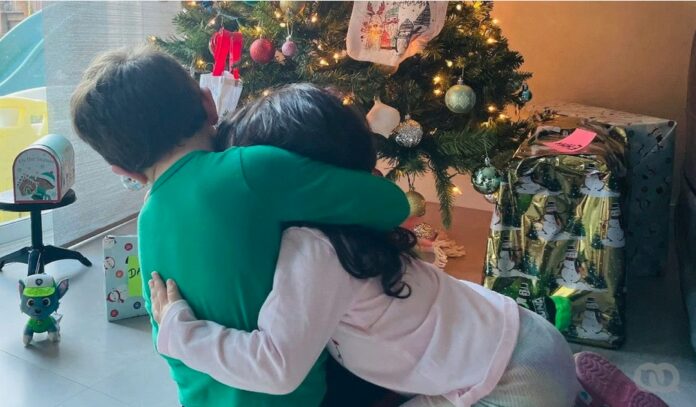
By Rachel Pereda (El Toque)
HAVANA TIMES – There is something about Christmas that has always seemed magical to me: the little trees, the parties, the lights in the windows, and that feeling that time pauses a bit to remind us of what truly matters. But there is also something about Christmas that, over the years, has become harder to bear: the expectation to be okay, to be happy, to live perfect moments, even if we don’t truly feel that way.
This year, while decorating the tree with my kids — honestly, I put it up for them because I didn’t feel like decorating the house — I felt a lump in my throat. I thought about the empty chairs, the families separated by migration, the distance that sometimes weighs more heavily during this season. I also thought about my own exhaustion, the internal battles I’ve had with my mental health, and how Christmas, instead of being a refuge, sometimes feels like an obligation.
It seems we arrive in December with an endless to-do list: family gatherings, gift exchanges, school activities, dinners, decorations… as if the magic of the season depended on checking off each task, without stopping to think if we really want to or can do them.
But behind the lights and perfect photos, there’s exhaustion, worries, pressures, and the feeling that we must keep up with a packed schedule. What if we simply can’t? What if this year all we want is to pause, breathe, and find our own way to celebrate, free from others’ expectations?
The Weight of Absences
For those remaining in Cuba, Christmas can be a nostalgic reminder of absences. Families who stay bear the weight of empty seats at the table, voices no longer heard, and an economic crisis that suffocates any attempt to celebrate.
The country, sunk in misery, turns even the simplest gestures into challenges. Buying food, finding a small gift, or just having electricity to light up the tree can be a battle. It’s a Christmas marked by farewells, where material shortages intertwine with the emotional pain of missing loved ones who have left.
For those of us who have emigrated, the distance is no less painful. Starting over in a new place means rebuilding life from scratch while carrying the need to support those left behind. We want to be the support our families need, but often that means working more, sacrificing time with our children, and facing our own loneliness. It’s hard to balance the desire to bring some joy back home with the need to build a solid foundation here. It’s like walking a tightrope, trying to hold ourselves up while reaching out in both directions.
For many migrants, Christmas is a reminder of everything we’ve left behind. It’s thinking of the table where we used to gather, now with empty spaces; it’s hearing songs that once filled the house with joy but now evoke nostalgia. It’s watching a video message from afar and wishing desperately for the screen to disappear and transport us back to the embrace of our loved ones.
The Responsibility of Creating Magic for Our Children
If I’ve learned anything as a mother, it’s that children don’t understand emotional crises or complicated realities. For them, Christmas is a world of lights and magic, and as parents, we feel the responsibility to make it special. But what happens when we’re not okay? How can we offer joy when all we feel is exhaustion, sadness, or anxiety?
This year, more than ever, I’ve tried to remember that the magic isn’t in the most expensive decorations or the biggest gifts. It’s in the little things: reading a story together, making hot chocolate, or simply sitting by the tree lights while I tell them about my own childhood. Christmas doesn’t have to be perfect; it just has to be authentic.
We are surrounded by images of perfect happiness: reunited families, tables overflowing with food, shared laughter. But that’s not everyone’s reality, and it’s okay to admit it. Some face this season with sadness, with the absence of a loved one, with financial struggles, or simply with accumulated emotional exhaustion. Some celebrate many achievements this year and bid farewell to 2024 with fulfilled dreams; for others, the greatest achievement was surviving, with all the pain that entails.
I’ve learned that it’s not about meeting others’ expectations. We don’t have to pretend to feel happiness we don’t feel or fill our calendars with commitments that only add to the burden. Sometimes, the most valuable thing we can do is say no and prioritize our well-being.
Perhaps this year is the time to redefine what Christmas means. Not as a parade of appearances, but as a space to connect with ourselves and with those we love. It can be a time to acknowledge our emotions, embrace our vulnerabilities, and find beauty in imperfection.
This December, I haven’t felt the desire to celebrate as I have in other years. But what I do know is that I will be there for my children — not with the perfection society sometimes demands, but with all the love I have, which is our greatest gift. Because in the end, Christmas isn’t about being okay all the time; it’s about being present, even amidst imperfection.
It’s okay to not be okay. It’s okay to miss, to cry, to pause. Christmas doesn’t have to be perfect to be special. Sometimes, just being is enough.
First published in Spanish by El Toque and translated and posted in English by Havana Times.
Read more from Cuba here on Havana Times.




